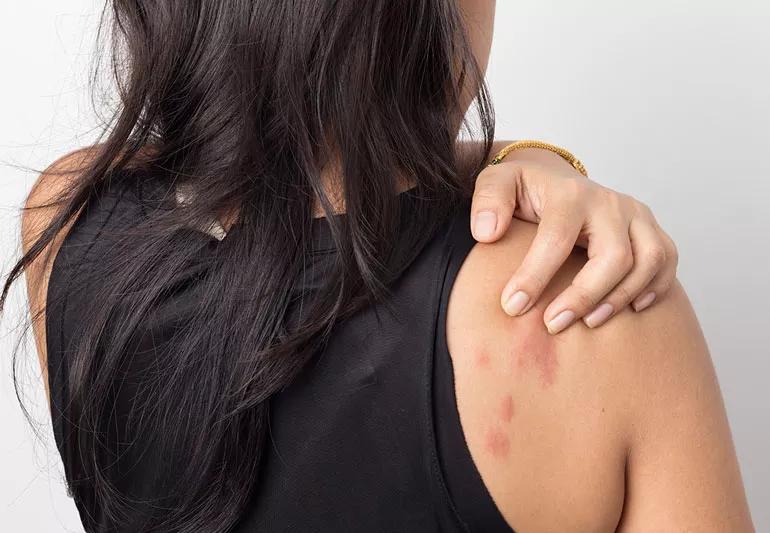It’s probably not a coincidence (or a punishment)

Image content: This image is available to view online.
View image online (https://assets.clevelandclinic.org/transform/a569e3da-062f-402e-8c66-5a4bba11ffa1/nervousHives-1003986118-770x553_jpg)
Woman itching hives on shoulder
It’s been a rough week. Your to-do list could probably wrap the Earth seven times. Stress levels are sky-high. And now? Out of nowhere, hives. Terrific! A health concern was just what this week needed.
Advertisement
Cleveland Clinic is a non-profit academic medical center. Advertising on our site helps support our mission. We do not endorse non-Cleveland Clinic products or services. Policy
You haven’t switched laundry detergents, tried a new shampoo or eaten any unusual foods. So why is the universe punishing you with itchy, burning welts when you’re already maxed out?
Turns out, stress hives are a thing. But why do you get them? And more pressingly, what can you do to soothe your screaming skin?
Here’s the 4-1-1 on stress rashes from family medicine physician Brian Myers, MD.
Hives are red welts that swell on the surface of the skin — and they can grow to the size of dinner plates. Sometimes, smaller hives merge into huge patches that cover large swaths of the body.
If you’ve never had hives before, you might think their appearance is the worst part. But, surprise! They can itch, burn or hurt, too.
Often, hives are an allergic reaction brought on by certain foods, fabrics or chemicals. But other times, extreme weather, sweat or plain old stress can trigger an outbreak — without warning.
They’re more common in women and often appear for the first time in your 30s, 40s or 50s. If you’ve had allergic hives before, you’re more likely to experience stress hives, Dr. Myers says.
Still, no one is immune. “It can happen to anyone out of the blue,” he says.
If your skin has erupted with red bumps:
Advertisement
How long can you expect to stay polka-dotted? Sorry to say it, but this gets worse before it gets better.
It’s totally normal (though unfair) for new hives to bubble up just as the first welts are fading. They will typically subside within a day or two, and you can treat them with over-the-counter antihistamines.
Now brace yourself for this last bit of bad news: Even after they subside, hives may not be through with you yet. Hive breakouts often come and go in waves and can flare up on and off for weeks.
If hives last longer than a few days, a doctor can help you figure out what’s going on.
Hives usually aren’t medical emergencies, though they can feel like a major disruption to your regularly scheduled programming. However, get medical attention post-haste if you have symptoms like fever or swelling of the mouth, tongue or lips, since those are signs of a more serious allergic reaction.
So is there any good news here? As usual, an ounce of prevention is the way to go: The best way to deal with hives is to try to identify and avoid triggers in the first place. If you are prone to hives (or just want to play it safe), be proactive.
It doesn’t hurt to keep antihistamines on hand, especially if you’re dealing with a stressful situation. Meanwhile, schedule time for self-care in your calendar to keep stress levels in check. And ask for help when you need it.
After all, there’s no downside to stress management, Dr. Myers points out. Your whole body will thank you — inside and out.
Advertisement

Sign up for our Health Essentials emails for expert guidance on nutrition, fitness, sleep, skin care and more.
Learn more about our editorial process.
Advertisement
Like other kinds of stress, grieving a loss can impact you physically and emotionally
Get to the source, offer encouragement and keep your cool
A healthy diet, regular exercise and counseling can all help reduce stress
Get expert tips on prevention and treatment
Bleeding is a risk and warrants taking care, but the reward of this lifesaving medication is great
Type 2 diabetes isn’t inevitable with these dietary changes
Applying a hot or cold compress can help with pain
Pump up your iron intake with foods like tuna, tofu and turkey